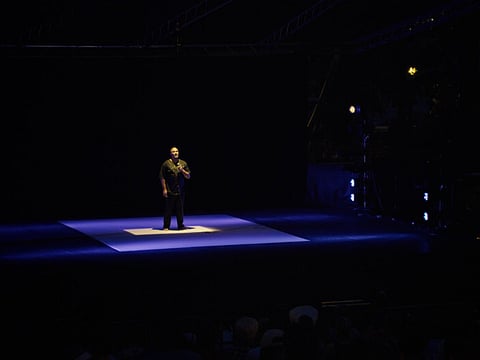‘Rodney King’ film review: Bleakly, poetic howl of rage
The acclaimed director brings a stark quality to this recording of Roger Guenveur Smith’s one-man stage show about the incident that sparked the LA riots

Spike Lee is marking the 25th anniversary of the 1992 Los Angeles riots with an hour-long Netflix special about Rodney King, whose vicious police beating triggered the chaos after the LAPD officers involved were acquitted despite their savage attack having been captured on video, filmed by a local man from his apartment balcony and seen by TV viewers around the world.
That video became the most famous witness footage since the Zapruder film of the Kennedy assassination; Lee used it as the prologue to his 1992 movie Malcolm X. This is a no-frills filmed record of a 2014 one-man stage show about King by the actor and writer Roger Guenveur Smith — a veteran of Lee’s movies — shot in front of a live audience who are mostly silent, except for a ripple of bleak laughter at one line about Condoleezza Rice. Smith delivers a stark, spare, breathless blast of prose-poetry that seems to inhabit both King himself and the persona of some aghast, sympathetic chorus. He is bathed in sweat, like a traumatised bystander. His performance is delivered on what is essentially a single liltingly impassioned note of horror: at times almost ululating with suppressed pain. This is a tough watch in some ways, making no concession to tonal light and shade, and (understandably) no concession to comedy, except for the driest, darkest sort. There is some acid wordplay on the phrase Ronald Reagan Presidential Library, which is received in such silence that I was at first convinced there could be no audience present at all.
The show is a preacher’s howl of anger and frustration at the personal and political forces which crushed King — racism, alcoholism, depression, crime, poverty, alienation and his own poignant unpreparedness for a media maelstrom — as well as his rejection from some following his well-intended plea for everyone to “get along”.
Smith offers a sharp insight when he says that Rodney King was history’s first reality TV star. His celebrity predated the smartphone and social media age, and he went viral before such a term existed. But the show tacitly underscores a larger truth: people realised it was the “accidental” recording of the incident that was extraordinary, not the beating itself. This sort of legally deniable thing was happening all the time — it just hadn’t been filmed before. And then, King became a more conventional type of reality TV star: a fallible, vulnerable, bewildered soul, burning through the payout he got from the civil suit and taking cash for appearing on shows that only extended his lonely ordeal.
The performance is austere and challenging, it takes us through the grim events, their aftermath and the long endgame of King’s life, but without the emollient or lenient notes that a Hollywood treatment might attempt. It is a requiem of a sort, and a sombre indication of all that has not yet healed, or been fixed.
Sign up for the Daily Briefing
Get the latest news and updates straight to your inbox


